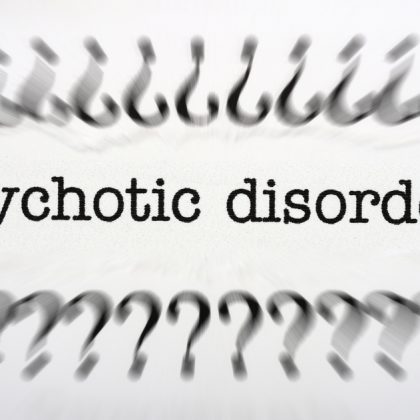Renaming schizophrenia
The name “Schizophrenia” is the subject of a new Forum in the journal Psychological Medicine. An article written by Bill George and Aadt Klijn, Foreign Affairs co-coordinators for Anoiksis (the Dutch association of and for people with a psychotic vulnerability), has been reflected on by various commentators.
Anoiksis has introduced a new name for the disease schizophrenia: psychosis susceptibility syndrome (PSS) with the aim that together with the old name, its attached prejudices, misleading significance and stigma can be thrown overboard.
Schizophrenia is a term loaded with negative connotations, since it still conveys an image of people with schizophrenia as all being unreliable, dangerous ‘lunatics’. The term consequently lends itself to stigma and self-stigma. Society stamps persons with schizophrenia with a negative hallmark; people diagnosed with schizophrenia then take the negative blueprint to themselves and this gives rise to a negative self-image. Not only does the term call up prejudices, it maintains misunderstandings, because schizophrenia means split personality and is therefore a misnomer. A split personality is in fact quite another disorder and has nothing to do with what we currently call schizophrenia.
Recently the World Health Organisation has been approached with a request to recognise the new name – currently the name PSS is not recognised either nationally or internationally.
Anoiksis has chosen the name Psychosis Susceptibility Syndrome (PSS) – the reasoning is as follows:
- Psychosis: because of the unreality of hallucinations and delusions.
- Susceptibility: because patients are not necessarily continually psychotic (but it is latent).
- Syndrome: because this word includes the negative and cognitive symptoms also associated with the disease. Negative symptoms include lack of feelings and energy while cognitive symptoms may be problems with concentration and memory or a reduced capacity for problem-solving for example.
Full commentaries have been provided by several people, who generally agree with the idea of changing the name, but argue that the biggest change will come from changing the public perception of schizophrenia.
Dr Brabban and colleagues comment, “There is no doubt that for many, the diagnosis of schizophrenia can be as debilitating as the associated symptoms. The word ‘schizophrenia’ appears to do more harm than good, more frequently communicating prejudice and misinformation than fact and hope. It is indisputable that the stigma surrounding the term schizophrenia can in itself lead to misery for many with the diagnosis. Therefore, any label that removes some of these disadvantages would be a welcome change.”
Professor Bentall states, “Schizophrenia has been a contested label for many years not only because it is associated with stigma, but also because it fails to achieve any of the purposes for which it was originally designed. Rebranding schizophrenia solves none of these problems. By replacing one ill-fitting label with another, we do nothing to advance psychiatric research or to develop better treatment plans for our patients.
“It is not hard to locate some of these causes [of stigma]. Without a doubt, one is the media’s treatment of schizophrenia, which consistently over-emphasizes the risk of dangerous behaviour by patients, conveying the impression that people with psychosis are responsible for an epidemic of interpersonal violence. The reality is, of course, quite different. Whereas there is an increased risk of violence associated with psychosis, most of this is attributable to co-morbid substance abuse and most psychiatric patients pose absolutely no risk to their neighbours.
“The problem has become not whether to replace schizophrenia, but what to replace it with. Simple re-labelling will do nothing to address the many scientific and clinical limitations of the categorical approach to diagnosis. Nor is it likely to address the problem of stigma, which arises out of background assumptions about the nature of severe mental illness. To persuade the general public to be more accepting of people with mental illness, we must persuade them that psychosis arises, in part, understandably from adverse life experiences (while of course acknowledging that genetic factors must play some role), that it does not necessarily lead to violence, and that recovery is possible.”
“Forum”, can be viewed free of charge for a limited time and comprises 5 articles.
View the original competition poster here.
View the winning name poster (English language) here.






An interesting and well-written blog. Thanks are due to Charlotte Porter.
This reform is long overdue. Amazing, amazing work!
Any name at this point will not have the same stigma. Who wants a misunderstood disorder coupled with a weird name. PSS is a very good option and certainly can do no more damage that the current name is doing. Also, please change the term “mental illness”. If we are discovering that it is neurological or biochemical, can it be described as that? “Mental illness” also does damage and should go away. The public can be educated. Thank you for the article.